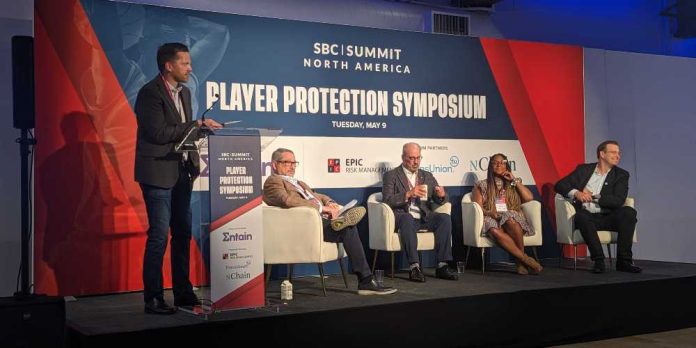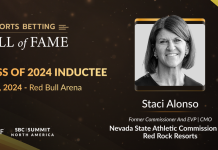At the opening session of the SBC Summit North America Player Protection Symposium, the panel marveled at how much technology is teaching us about problem gambling behavior but also lamented the lack of cohesion and multi-jurisdictional collaboration as the industry grows.
The UNLV Internationa Gaming Institute Distinguished Fellow, Responsible Gaming Alan Feldman moderated a panel that featured:
Princeton Public Affairs Group Partner Bill Pascrell III
Rush Street Interactive Director of Corporate Social Responsibility Tammi Barlow
National Council on Problem Gambling Executive Director Keith Whyte
The topic at hand was Managing Player Risk Through Technology. The conversation began with what technology and research has taught the industry, particularly what it has taught us about some long-held assumptions.
Research and tech defy some assumptions about sports betting
“There are certain things that we just take for granted, right? Frequency. If someone is betting frequently, there could be a good indication of risk,” Feldman offered as an example. “Turns out that is maybe the weakest of the risk indicators.”
Feldman similarly pointed to ATM withdrawal rejections as a flawed metric, though this one is skewed from a number of declines associated with inputting the wrong PIN number. Barlow noted that recent DHEA research showed that many sports bettors actually knew less about betting than non-bettors.
One paradoxical lesson we’ve learned as sports betting has grown in the US is that, unlike other forms of gambling, education has an inverse relationship with the endeavor.
“Unlike everything else that we know is positively correlated with income and education, something about going to college in America makes someone twice as likely to bet sports as if they only graduate high school. That is a massive difference,” noted Whyte.
Whyte also pointed out that with indicators of risk, like Feldman discussed, there are so may risk factors and they can function very differently across different populations. That is why NCPG is working with groups awarding agility grants to schools like Towson to help learn more about particularly vulnerable populations.
The panel agreed the scope of research technology bringing is a positive, however the response to the research might be misguided. Pascrell called out the effort to federally ban sports betting advertisements proposed by Rep. Paul Tonko in particular.
“You’re not accomplishing anything by doing that. The way to impact RG from a regulator standpoint and a politician standpoint is to regulate,” he said.
Regulators making great strides but need multi-jurisdictional collaboration
Regulators are doing great things. Barlow cited New Jersey’s efforts as particularly strong, but lamented that state-by-state regulators are missing the boat when it comes to multi-jurisdictional collaboration.
Two issues that Barlow and Whyte were particularly passionate about advocating for were a universal adoption of the 1-800-GAMBLER hotline and a multi-jurisdictional self-exclusion list. Pascrell shared a personal story of how his son realized he might have some problem gambling behavior and told his father that he put himself on the self-exclusion list in New Jersey but noted he could just as easily drive across the bridge to bet in New York and wager there.
Feldman noted that the technology to help people put in protections is there, it is just a matter of getting more collaboration across states to avoid putting the onus on the player to take action multiple times in multiple places.
The panel was not entirely in agreement on everything though. The conversation ended with a discussion about how to approach those under of the age of 21, particularly on college campuses. Pascrell noted the multi-city tour some gambling representatives have gone on, noting that no one is preparing the underaged population to gamble responsibly. Pascrell is eager to help educate the population since no one else is doing it.
Whyte pointed out that the idea of talking to underage people about gambling is not the issue, but rather that the operators themselves should not be the people doing it.
Operators should continue to embrace technology and embrace evidence-based research though, especially as new studies give us new insights that help us question some assumptions we’ve made about the industry so far.














